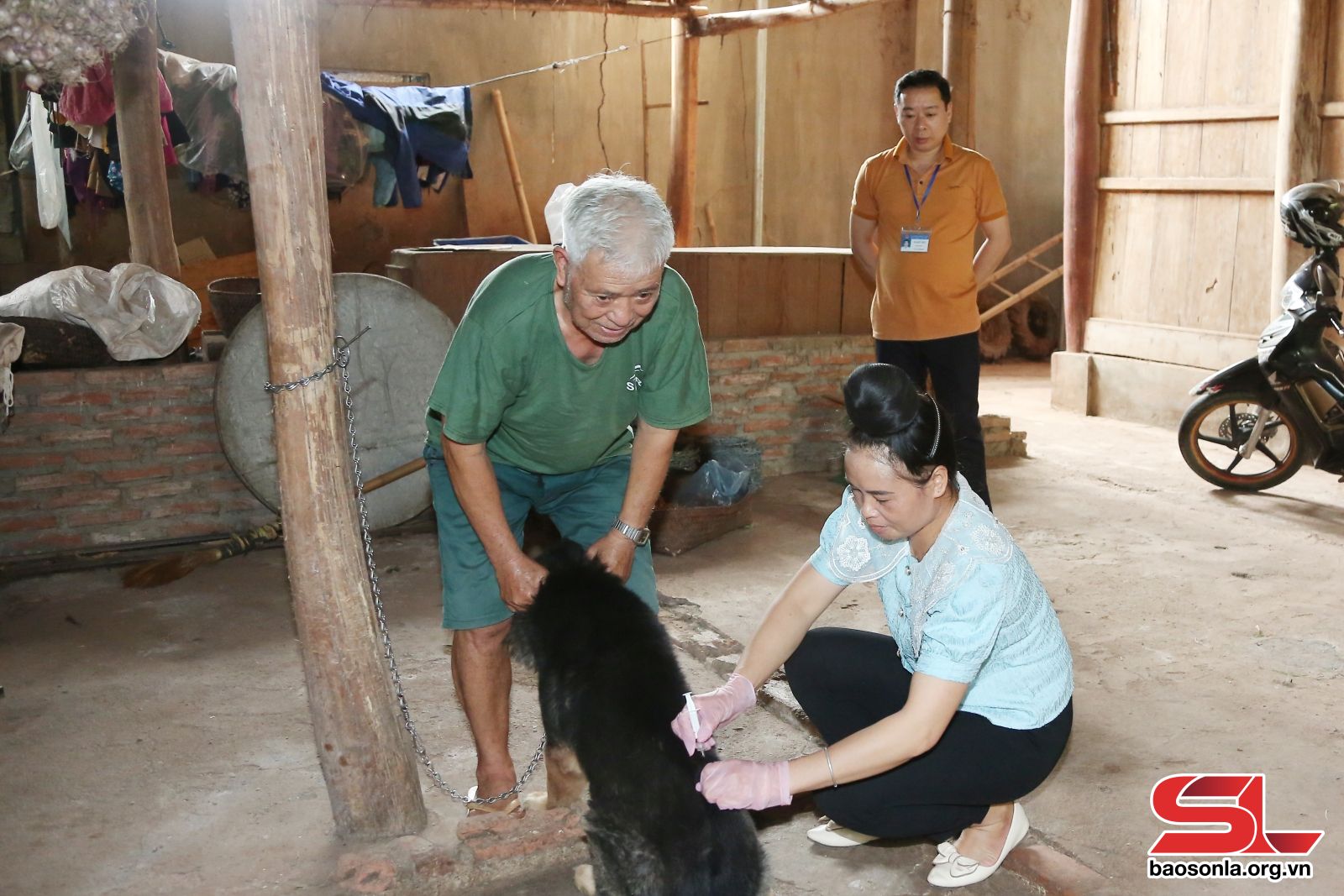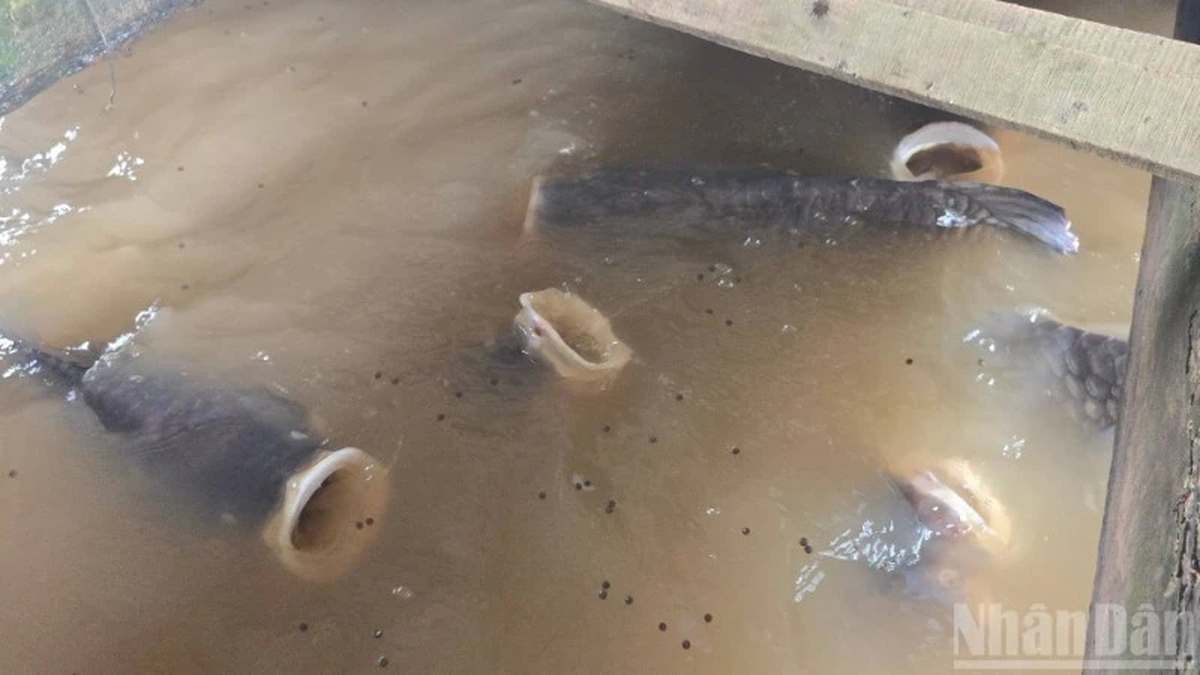According to statistics, Yen Chau district has about 13,350 dogs and cats that need to be vaccinated. Currently, entering the hot season when rabies is likely to occur, the District People's Committee has directed specialized agencies to coordinate with communes and towns to proactively prevent and control rabies and organize vaccinations for dogs and cats.

At the end of December 2023, the District Agricultural Service Center received a report from Chieng Khoi commune about a dog belonging to a household in Hiem village showing signs of not eating, being aggressive, biting dogs, cats and 10 passersby. Suspecting rabies, the unit urgently sent specialized staff to the area to investigate the epidemic and take samples to send to the Central Veterinary Diagnosis Center for testing. The sample tested positive for rabies virus. The unit coordinated with the Commune People's Committee to zone off, announce the outbreak, urgently track down and destroy 7 dogs. At the same time, coordinate with the District Health Center to propagate to each household about the dangerous nature of rabies, prevention and control measures before and after exposure so that people can proactively prevent the disease.
In Sap Vat commune, a case occurred where a cow owned by Mr. Lo Van Kiem in Nghe village was bitten by a stray dog on February 16, 2024. After nearly a month of being bitten, the cow showed signs of lethargy, stopped eating, had a stiff jaw, and foamed at the mouth. Suspecting rabies, the commune veterinary officer instructed the family to isolate the cow for monitoring. On April 14, the cow died. The district's Agricultural Service Center coordinated with the provincial Department of Animal Husbandry, Veterinary and Aquatic Products to collect samples (cow's head) and send them to the Central Veterinary Diagnosis Center for testing and coordinated with the commune People's Committee to destroy the sick cow weighing 113 kg. The test results of the cow's sample were positive for rabies virus.
Mr. Dao Quoc Khoa, Deputy Director of the District Agricultural Service Center, said: For the two rabies outbreaks in livestock in the two communes of Chieng Khoi and Sap Vat, the district has implemented control solutions to prevent rabies from spreading widely. Of which, 4,200 doses of rabies vaccine have been injected into dogs and cats in communes in the epidemic and threatened epidemic areas. People are advised not to buy, sell, or transport dogs and cats in and out of the epidemic areas. Currently, rabies in livestock has been controlled and no new cases of rabies have occurred. All cases of rabid dog bites have not resulted in death.
In addition, the district directed communes and towns to step up propaganda and mobilization to raise awareness among households about disease prevention for dogs and cats. According to the plan, the district will deploy 13,360 doses of rabies vaccine on dogs and cats from March to June, immediately after the vaccine supply is available. Accordingly, the specialized agency has deployed the plan to communes and towns in the district; propagated to the people; checked and counted the number of dogs and cats and made a list of registered vaccinations according to regulations. Vaccinations are organized in a rolling, concentrated, and final manner for each village and sub-region. The minimum vaccination rate is 80% or more compared to the total number of animals in the vaccination area, avoiding widespread and prolonged vaccination, ensuring disease safety for livestock.
Mr. Hoang Van E, Miet Sai village, Sap Vat commune, shared: My family often raises dogs to guard the house, mainly in captivity. The commune veterinary staff came to propagate, so I understood more about the dangers of rabies in dogs and the transmission to humans if bitten by a rabid dog. Therefore, every year, my family always performs vaccinations according to local instructions and regulations to ensure safety for the family and society.
Mr. Luong Van Quyet, Director of the District Health Center, said: Currently, there is no cure for rabies. People bitten by dogs carrying the rabies virus will incubate, develop the disease and die. Therefore, to prevent and control rabies from spreading to humans from dogs and cats, we have stepped up propaganda to raise people's awareness and how to treat wounds when bitten by dogs and cats. In the past 3 years, the district has not recorded any deaths due to rabies.
Hot weather poses a high risk of rabies outbreaks in dogs and cats. Therefore, the best way to prevent rabies is for each household raising dogs and cats to strictly comply with rabies vaccination for pets; keep them in captivity, do not let them roam freely. When bitten by a dog, first aid for the wound with soap and clean water, go to a medical facility to get vaccinated against rabies, and notify local authorities of the incident for timely handling.
Article and photos: Thu Thao
Source


























![[Photo] National Assembly Chairman Tran Thanh Man visits Vietnamese Heroic Mother Ta Thi Tran](https://vphoto.vietnam.vn/thumb/1200x675/vietnam/resource/IMAGE/2025/7/20/765c0bd057dd44ad83ab89fe0255b783)








































































Comment (0)